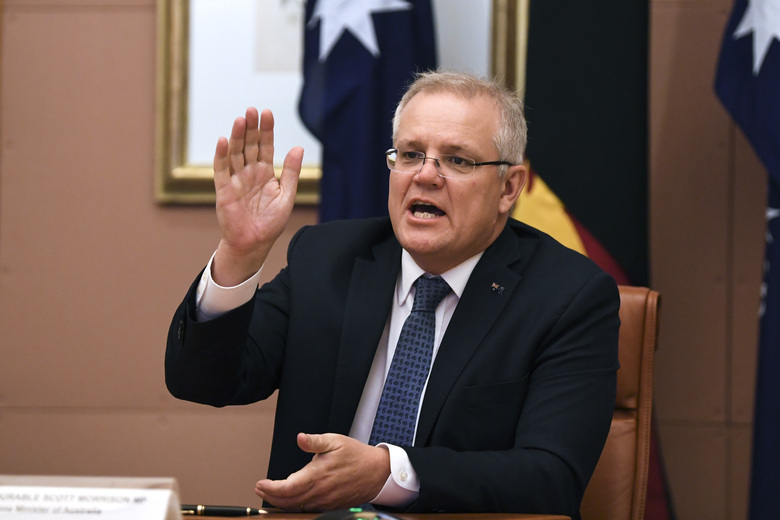- Prime Minister, Scott Morrison has urged the United States and China to respect international law and resolve disputes peacefully
- The Prime Minister gave his keynote address at the annual Aspen Security Forum as relations between the U.S. and China continue to sour
- He said China and the U.S. have a responsibility to uphold ‘the common set of rules’ that build an international society
- Of course, Australia’s own relationship with China has soured over the past year, with existing trade tensions exacerbated by Australia’s rejection of China’s territorial claims in the South China Sea
- The Prime Minister reaffirmed Australia’s commitment to the “Five-Eyes” partnership and emphasised the recently-increased defence budget as a way to balance China’s power in the Indo-Pacific region
Prime Minister Scott Morrison has used his platform at the Aspen Security Forum to urge the United States and China to respect international law.
The Prime Minister gave his keynote address via video link at an annual three-day conference designed for global leaders to discuss national security issues.
The relationship between the United States and China has been souring over recent years due to an ongoing trade war and, more recently, the Trump administration’s reaction to Beijing sedition laws over Hong Kong, China’s territorial claims over the South China Sea, and U.S. criticism of Chinese tech companies.
In the last month alone, the U.S. has publically slammed China’s South China Sea claims, weighed sweeping travel bans against members of the Chinese Communist Party, threatened to ban Chinese-owned social media app TikTok, and more.
Each of these moves has been heavily criticised by China, with retaliatory threats made by the Chinese government worsening the relationship between the two countries.
Prime Minister Scott Morrison cited Hedley Bull’s 1977 international relations book The Anarchical Society in his address to the U.S. and China, saying:
“Together, China and the United States have a special responsibility to uphold what Bull described as ‘the common set of rules’ that build an international society.”
Prime Minister Scott Morrison, August 2020
He said that means respecting international law and the peaceful resolution of disputes.
“It means a commitment to rules-based economic interaction,” Prime Minister Morrison said.
“Neither coercion nor abdication from the international system is the way forward.”
Australia’s rocky China relations
Of course, Australia has seen its own relations with the Eastern giant take a turn for the worse in 2020.
After the Australian Government suggested an investigation into China’s handling of the COVID-19 pandemic, China introduced higher tariffs of Australian beef and barley. The Chinese government denied that the increased tariffs had anything to do with politics.
In late-July, Australia joined the U.S. in rejecting China’s “unlawful” claim to most of the territory in the South China Sea. China’s response was scathing.
“Although China-Australia relations have already drastically soured, Australia has chosen to show its loyalty for the U.S. It rejected China’s claim at the U.N. level, which will have quite a negative impact,” the Global Times, a Chinese newspaper speaking on behalf of the government, reported.
In his Aspen Security Forum address, Prime Minister Morrison said Australia has welcomed China’s rise as a major economic partner.
“It has been great for our economy and the global economy and the Indo-Pacific region,” he said.
“But with the economic rise does come economic and broader strategic responsibility. China has a role to enhance regional and global stability, commensurate with its new status,” he added.
However, the Prime Minister also reaffirmed Australia’s commitment to the “Five-Eyes” partnership — a longstanding alliance between Australia, the U.K., the U.S., Canada, and New Zealand.
“We look to, and share a belief in, the values and institutions that the United States has championed and we share. We respect each other as equal partners with the United States,” the Prime Minister said.
He also flagged Australia’s increased military spending and strengthening of relationships with other Asian countries as a way of helping balance China’s power in the Indo-Pacific region.

